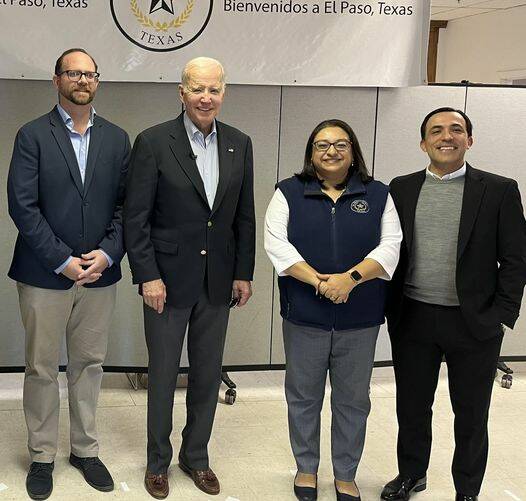
Brownsville Mayor Trey Mendez was one of just two border mayors invited to meet with Joe Biden during the president’s Jan. 8 trip to El Paso.
The other was El Paso Mayor Oscar Leeser, who hosted the visit, which Biden made on his way to Mexico City with Homeland Security Secretary Alejandro Mayorkas to meet with Mexican President Andrés Manuel López Obrador and Canadian Prime Minister Justin Trudeau for a summit on migration, trade, illegal drug trafficking and energy.
Toward the end of the El Paso visit, Biden stopped by El Paso County’s migrant processing center, where Mendez was the first to greet the president upon his arrival at the facility.
“He got to see not only the operations but got to meet with some of the (non-governmental organizations) that provide food and other help to the migrants as they’re being processed, then he spoke to staff after that,” Mendez said.
Brownsville’s mayor was invited to El Paso because the migrant processing center has adopted what Biden administration officials are calling the “Brownsville model,” an initiative by Mendez and Brownsville Emergency Management Director Odee Ann Leal that began with executive orders issued in January 2021.
The initiative, in response to growing number of migrants showing up on the city’s southern doorstep, essentially involved refining and streamlining how migrants were being processed in Brownsville and eliminating inefficiencies where possible, Mendez said, adding that the effort was made possible by “great communication with our federal partners, (U.S.) Customs and Border Protection.”
“We have the capacity to process 1,000 people a day,” he said. “It’s never really gotten that high, but we’ve processed as many as 700 people in a day. Basically we receive them, help them with travel accommodations. Most people are leaving by plane or bus. We put them in contact with their sponsor. … Ninety percent of (migrants) that come through Brownsville are out and on their way to their sponsor and their final destination within 12 hours.”
Although Brownsville is normally a pass-through for migrants rather than a destination, as the “front door” to the United States “we have the responsibility to take care of them with dignity and respect, and make sure that we help them get to their destination, their sponsor and make it as quick and easy as possible,” Mendez said.
The city partners with NGOs such as Team Brownsville, Good Neighbor Settlement House and Iglesia Bautista West Brownsville, which provide food, care packages, coordination and other assistance for migrants, he said.
“With higher numbers we just needed to find a way to process people as quickly as possible and keep them off the streets of Brownsville, and we’ve done that,” Mendez said.
“That’s really why you don’t see any news reports regarding Brownsville having any sort of crisis, because we worked really hard to make sure that we can address those people that are coming through Brownsville and making sure that we get them to their destination. It’s been a success so far and we’re talking to other communities about using the same type of system.”
El Paso County officials toured the Brownsville center in May and October, he said, and admitted “it was really cool to see our model in operation” in El Paso. Mendez said he hopes Biden and Mayorkas came away with some good ideas for addressing the country’s immigration issues.
“It’s been decades that people have been trying to find solutions,” he said. “I’m really hopeful that the pieces are in place to try and find resolution, but I guess if we’ll see if that’s possible.”
Mendez, who was invited to the White House four times in 2022 for various events, most recently a holiday reception, said his office is actively encouraging Biden to visit Brownsville. Whether or not that comes to pass, a chance to familiarize the president with the “Brownsville model” — even in a city 700 miles away — is still a plus, he said.
“It’s always good to try to elevate Brownsville on a national level and talk about the good things that we’re doing, and this is about as great an audience as you can get,” Mendez said.




